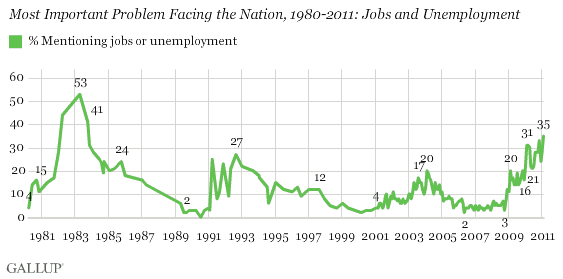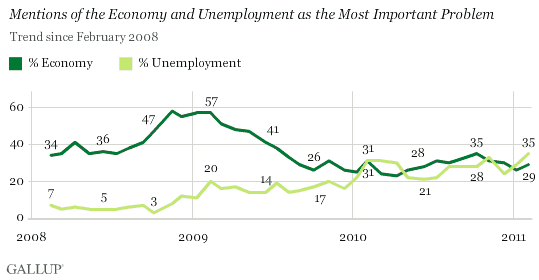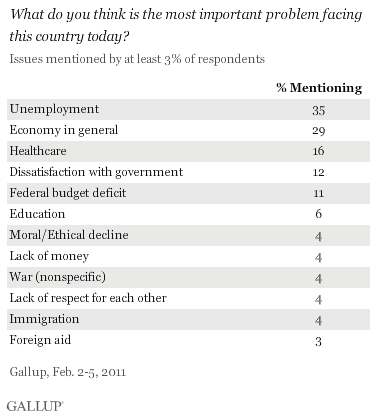PRINCETON, NJ -- Thirty-five percent of Americans name unemployment as the most important problem facing the U.S., the highest percentage since the economic slowdown began and higher than at any point since October 1983 (41%). Unemployment is the most important problem for the second month in a row, with the economy ranking second and healthcare third.

From the beginning of the economic slowdown through 2009, mentions of "the economy" in general were consistently the top issue. In the past year, as the government's unemployment rate has stayed in the 9% range, the economy and specific mentions of unemployment have traded the top spot several times. This month, mentions of unemployment increased to 35%, and it now leads mentions of the economy by a significant margin.

In addition to unemployment and the economy, three other issues are mentioned by at least 10% of Americans in the Feb. 2-5 poll -- healthcare, dissatisfaction with government, and the federal budget deficit. Although it has dominated the news lately, the situation in Egypt is mentioned by only a small number of respondents and does not rank among the top 10 problems.

The top five problems overall are also the top five among each party group, though with some minor differences. Democrats are more likely than independents and Republicans to mention unemployment and are about twice as likely to mention healthcare. Republicans are more likely than independents or Democrats to mention the federal budget deficit, which ranks as the No. 3 issue among Republicans. Republicans are about equally likely to mention the economy and unemployment.

Implications
All told, 7 in 10 Americans mention some economic issue when asked to name the most important problem facing the country, and the top two problems Americans cite as the most important ones facing the country directly reflect on the economic situation in the United States.
Until the economy improves significantly, that trend is likely to continue, since Americans usually rate the economy, or specific aspects of it such as unemployment or inflation, as the most important problem over other issues whenever the country is in a recession or economic slump.
The economy's health over the next 20 months will be important in determining whether President Obama will be re-elected. One key to Obama's winning a second term could be whether mentions of unemployment continue to go up or decline. Unemployment ranked high as a most important problem in 1976, 1984, and 1992 -- all years in which an incumbent president was trying to win an election. The general trend in mentions of unemployment rose over the course of 1976 and 1992, prior to Gerald Ford's and George H.W. Bush's defeats, but declined in the months leading up to Ronald Reagan's 1984 victory.
Survey Methods
Results for this Gallup poll are based on telephone interviews conducted Feb. 2-5, 2011, with a random sample of 1,015 adults, aged 18 and older, living in the continental U.S., selected using random-digit-dial sampling.
For results based on the total sample of national adults, one can say with 95% confidence that the maximum margin of sampling error is ±4 percentage points.
Interviews are conducted with respondents on landline telephones (for respondents with a landline telephone) and cellular phones (for respondents who are cell phone-only). Each sample includes a minimum quota of 150 cell phone-only respondents and 850 landline respondents, with additional minimum quotas among landline respondents for gender within region. Landline respondents are chosen at random within each household on the basis of which member had the most recent birthday.
Samples are weighted by gender, age, race, education, region, and phone lines. Demographic weighting targets are based on the March 2010 Current Population Survey figures for the aged 18 and older non-institutionalized population living in continental U.S. telephone households. All reported margins of sampling error include the computed design effects for weighting and sample design.
In addition to sampling error, question wording and practical difficulties in conducting surveys can introduce error or bias into the findings of public opinion polls.
View methodology, full question results, and trend data.
For more details on Gallup's polling methodology, visit www.gallup.com.
